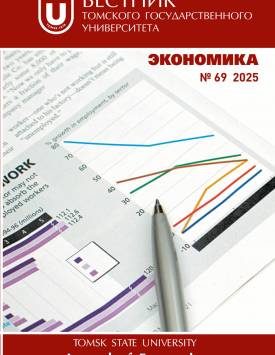Conceptual approaches to building financial models of social welfare in the context of structural economic transformation and global challenges
An advanced social welfare system in the context of sustainable economic growth is a crucial element of human life in contemporary conditions. It enables the state to go beyond mere economic growth and provide a range of social guarantees for citizens, meeting the principles of sustainable development and socially significant needs of society. The transformation of social welfare systems occurs in parallel with changes in the global economy, making the scientific discourse on future financial models for social welfare increasingly relevant. This article explores conceptual approaches to constructing financial models for social welfare within the framework of global challenges and structural economic transformation. Fundamental principles of such models are examined, including social justice, intergenerational solidarity, the protection of citizens' social rights, system stability and security, as well as economic efficiency. Various theoretical approaches to financing social welfare are analyzed: universalism, selectivism, subsidiarity, and residualism. The study substantiates the need to transition toward mixed financial models for social welfare, which can better adapt to challenges related to digitalization, population aging, climate change, and geopolitical risks. Particular attention is paid to the role of the state in the social welfare system and potential directions for fiscal decentralization to enhance resilience and effectiveness. The conclusions emphasize the importance of adapting social systems to achieve sustainable economic growth and social equity amid global changes. The author declares no conflicts of interests.
Keywords
social welfare,
sustainable development,
financial model,
social justice,
global challenges,
fiscal decentralizationAuthors
| Dorofeev Mikhail L. | Financial University under the Government of the Russian Federation | dorofeevml@yandex.ru |
Всего: 1
References
ILO. World Social Protection Report 2024-26 Universal social protection for climate action and a just transition. URL: https://www.social-protection.org/gimi/Media.action?id=10982 (дата обращения: 10.09.2024).
Andersen J.G. Universalization and de-universalization of unemployment protection in Denmark and Sweden // Welfare state, universalism and diversity. 2012. Р. 162-186.
Дорофеев М.Л. Эволюция финансово-инвестиционных моделей социального обеспечения под воздействием современных глобальных вызовов // Экономика. Налоги. Право. 2024. Т. 17, № 2. С. 60-70.
Дорофеев М.Л. Анализ эффективности региональных финансовых моделей социального обеспечения населения России на основе метода DEA // Вопросы экономики. 2023. № 6. С. 117-137.
Esping-Andersen G. The three worlds of welfare capitalism // Polity. 1990.
Petersson J. Universalism in New Clothes - New Conditions and New Features in the Welfare State // Social Policy and Social Work: From an International Development Perspective. 2008. Vol. 1. Р. 23.
Laenen T., Gugushvili D. Are universal welfare policies really more popular than selective ones? A critical discussion of empirical research // International Journal of Sociology and Social Policy. 2021. Vol. 41, № 9/10. Р. 1134-1147.
Anttonen A., Sipila J. European social care services: is it possible to identify models? // Journal of European social policy. 1996. Vol. 6, № 2. Р. 87-100.
Leibfried S., Pierson P. European social policy: Between fragmentation and integration. 1995.
Hacker J.S. Privatizing risk without privatizing the welfare state: The hidden politics of social policy retrenchment in the United States // American Political Science Review. 2004. Vol. 98, № 2. Р. 243-260.
Saltman R., Busse R., Figueras J. Decentralization in health care: strategies and outcomes. McGraw-hill education (UK), 2006.
Vrooman J.C. Regimes and cultures of social security: Comparing institutional models through nonlinear PCA // International Journal of Comparative Sociology. 2012. Vol. 53, № 5-6. Р. 444-477.
Powell M., Yoruk E., Bargu A. Thirty years of the three worlds of welfare capitalism: A review of reviews // Social Policy & Administration. 2020. Vol. 54, № 1. Р. 60-87. 10.1111/spol. 12510.
Ferrera M. The 'Southern model' of welfare in social Europe // Journal of European social policy. 1996. Vol. 6, № 1. Р. 17-37.
Wilensky H.L. The welfare state and equality: structural and ideological roots of public expenditures. University of California Press, 1974. Vol. 140.
Van Parijs P. Basic income: a simple and powerful idea for the twenty-first century // Politics & Society. 2004. Vol. 32, № 1. Р. 7-39.
Gentilini U. et al. (ed.). Exploring universal basic income: A guide to navigating concepts, evidence, and practices. World Bank Publications, 2019.
Капелюшников Р.И. Универсальный базовый доход: есть ли у него будущее?: препринт WP3/2020/04 М.: Изд. дом Высшей школы экономики, 2020. 52 с.
Soss J., Fording R. C., Schram S. Disciplining the poor: Neoliberal paternalism and the persistent power of race. University of Chicago Press, 2011.
Sen A. Capability and well-being73 // The quality of life. 1993. Vol. 30. Р. 270-293.
Рекомендация о минимальных уровнях социальной зашиты // Международная конференция труда, 101-я сессия. Женева, 2012. URL: https://www.ilo.org/wcmsp5/groups/public/-ed_norm/-normes/documents/normativeinstrument/wcms_r202_ru.pdf (дата обращения: 10.09.2024).

